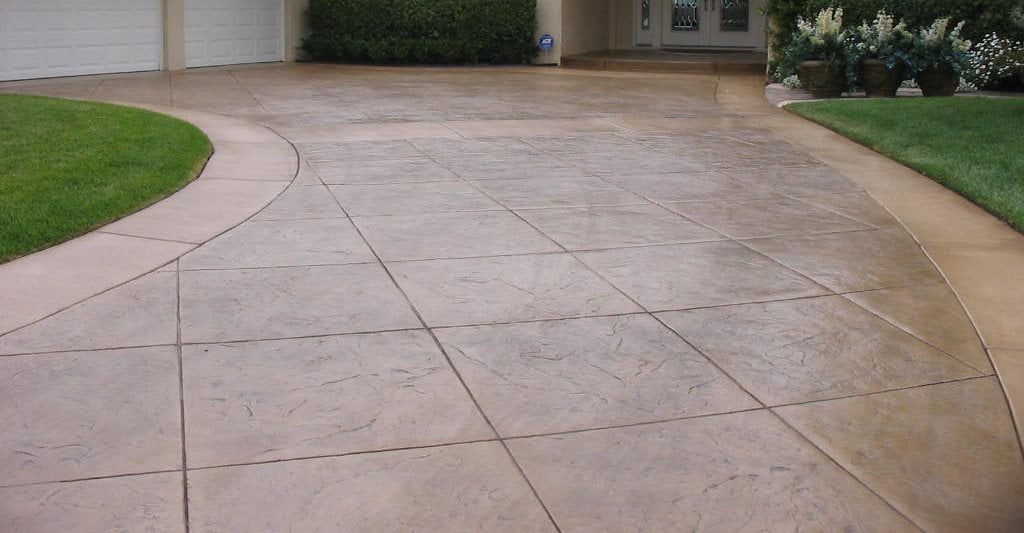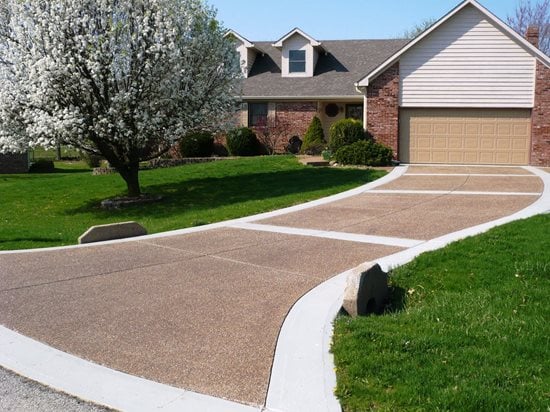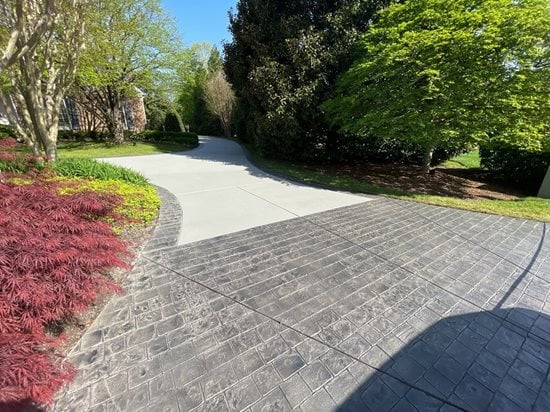- Concrete Driveways Info
- Concrete Driveway Pictures
- Exposed Aggregate
- Stamped Concrete Driveways
- Stained Concrete Driveways
- Modern Concrete Driveways
- Driveway Width
- Concrete Driveway Projects: Submitted by driveway contractors across the U.S.
- Concrete Driveway Cost
- Installing and Maintaining Concrete Driveways
- Concrete Driveway Construction Basics
- How to Clean a Concrete Driveway
- Concrete Driveway Maintenance
- Concrete Driveway Resurfacing
- Concrete Driveway Repair
- Driveway Sealer for Concrete
- Related Information
- Design Ideas: Concrete Driveway Info
- Concrete Contractors: Find Concrete Products and Suppliers
Concrete Driveways - Decorative Options & Design Ideas
Tips and design options for a durable, low-maintenance concrete driveway that boosts the curb appeal of your homeIt wasn't long ago when deciding on a driveway material was easy: asphalt or concrete. Today, the "concrete" choice has expanded to include an astounding array of decorative options. Sometimes referred to as a cement driveway or as painted concrete, decorative concrete is one of the most reasonable ways to spruce up the entrance to your home.
 Concrete Driveway Cost
How much does a concrete driveway cost? Find out average prices and what design features contribute to the cost.
Concrete Driveway Cost
How much does a concrete driveway cost? Find out average prices and what design features contribute to the cost.
 Concrete Driveway Pictures
Browse our collection of 100+ concrete driveway photos for inspiration and ideas for your property.
Concrete Driveway Pictures
Browse our collection of 100+ concrete driveway photos for inspiration and ideas for your property.
 Driveway Pavers
Discover why concrete pavers are a good choice for a driveway.
Driveway Pavers
Discover why concrete pavers are a good choice for a driveway.
 Stamped Concrete Driveways
Learn how patterns can be imprinted in a freshly placed driveway to achieve the high-end look of stone or brick.
Stamped Concrete Driveways
Learn how patterns can be imprinted in a freshly placed driveway to achieve the high-end look of stone or brick.
 Concrete Driveway Contractors
Find local concrete driveway contractors and request free quotes for your project.
Concrete Driveway Contractors
Find local concrete driveway contractors and request free quotes for your project.
 Concrete Driveway Design
Get behind-the-scenes info on decorative concrete driveway projects from across the country.
Concrete Driveway Design
Get behind-the-scenes info on decorative concrete driveway projects from across the country.
Although plain gray concrete is still installed most often, more people are catching on to the dazzling effects possible with decorative concrete—and seeing the instant curb appeal a decorative driveway can give to any home, no matter what the style (see Which Decorative Concrete Style Is Right for Your Home?).
If you already have a concrete driveway, you can still give it a decorative makeover. The concrete industry has introduced many products and methods that can rejuvenate or resurface existing plain-gray driveways.
Concrete Driveways - Staining and Sawcutting Ideas
Time: 02:59
See all concrete driveway videos
Of course, to ensure that your concrete driveway will look good for many years to come, there are important steps your driveway contractor should follow during installation. How well your driveway looks and performs long-term is largely related to the quality of workmanship and materials that go into it. To help ensure a problem-free driveway, be sure to read our overview of driveway construction basics.
Once you become the proud owner of a concrete driveway, it won't take much effort on your part to keep it looking its best for many years to come. Read our tips on how to care for and maintain a concrete driveway.
COMMON QUESTIONS ABOUT CONCRETE DRIVEWAYS
How do I find the right contractor to install my driveway?
Start your search right here by using the Concrete Network's Find a Concrete Contractor locator. You can search by zip code or state for contractors in your area that install new concrete driveways or resurface existing driveways.
Other ways to hunt down a contractor:
- Look at decorative concrete driveways in your neighborhood and get the names of the contractors who installed the driveways that appeal to you most. Be sure to ask the homeowners about their experience with the contractor and the quality of the workmanship.
- Get references from friends, homebuilders or local ready-mix suppliers.
- Get names through your local Yellow Pages.
Once you come up with a list of contractors, be sure to ask for references and get a list of projects in your area that you can check out. Also ask how long the contractor has been in business, if they're insured, whether they have any professional certifications, and if they offer a warranty for their work. Read our 8 Tips for Hiring a Concrete Contractor for Exterior Work.
Do I need to seal my new concrete driveway?
You should apply a high-quality sealer to all exterior concrete slabs exposed to freeze-thaw conditions. The sealer helps protect the concrete from moisture absorption, exposure to chemicals, and grease and oil stains. On decorative colored concrete, a sealer will also help enhance the color (see What's the Best Concrete Driveway Sealer?).
Generally, there are two categories of sealers for exterior concrete: film-formers and penetrants. Penetrating sealers tend to offer the best protection from moisture absorption. Regardless of the sealer you use, be sure it's applied according to the manufacturer's instructions.
What if the driveway cracks?
If your concrete was jointed properly, cracks are unlikely to be a problem. Think of joints as "planned" cracks that allow the concrete to expand and contract, minimizing any chance for random cracking.
Although joints will control cracking in most cases, even properly jointed concrete can crack in places other than the joints. Most of these random cracks are simply unplanned joints and won't impact the long-term service and durability of your driveway. But they can detract from the appearance. If you're concerned about random cracking, ask your contractor what measures he will take to prevent it and what his policy is about fixing any random cracking that does occur.
What if the color isn't what I expected?
It's unrealistic to expect your contractor to precisely match the color of your concrete driveway to a showroom sample, a neighbor's decorative concrete driveway, or a photo from a brochure. Even plain concrete can exhibit color variations, especially if the project requires more than one load of concrete or if the concrete placements are made on different days. Most of these variations are minor and will fade over time.
What is the cost of a stamped concrete driveway?
Your initial cost to install a stamped concrete driveway can range anywhere from $6 per square foot for basic stamped concrete (using just one pattern and color) to $15 or more per square foot for elaborate multi-pattern designs with special coloring effects (see Stamped Concrete Driveway Cost). While stamped concrete is pricier than asphalt, you'll get a much better return on your investment. Not only does a concrete driveway last longer and require less maintenance than most other paving materials, it can help boost the resale value of your home by adding curb appeal.
Read more about concrete driveway cost.
Can I get a warranty for my concrete driveway?
Yes! Many contractors will warrant their work, and you may be able to obtain an extended warranty (three years or longer) through your state concrete association, such as the Six Star Driveway Program available from the Michigan Concrete Association. Contractors and concrete producers who participate in the program agree to follow certain installation criteria and quality-control standards and will correct-for the duration of the warranty-any problems that occur due to their negligence.
GOING GREEN WITH CONCRETE DRIVEWAYS
Few driveway paving materials can match concrete when it comes to sustainability and conserving the environment. Below are some of the top reasons why.
They are made with renewable resources.
Unlike asphalt pavements that are made with nonrenewable petroleum supplies, concrete pavements are made from abundant, sustainable resources including water, natural rock and sand, and cement. The predominant raw material for the cement in concrete is limestone, the most abundant mineral on earth.
They can utilize recycled and waste materials.
Your ready-mix supplier can also make the concrete for your driveway using waste byproducts, which reduces the consumption of raw materials and keeps waste out of landfills. Fly ash, ground blast furnace slag and silica fume-all byproducts from power plants, steel mills and other industrial processes-are commonly used as partial cement replacements. You can also use recycled aggregates in the concrete mix and reinforcing steel that has a high recycled content.
They save energy by reflecting light.
Concrete is naturally brighter and more reflective than asphalt, saving energy by reducing the need for lighting at night. A concrete surface is up to 2 times more reflective than asphalt pavements, according to the American Concrete Pavement Association. In addition, light-colored paving materials help reduce the heat-island effect in urban areas.
They last longer.
A properly installed concrete driveway should last for many decades-and at least two or three times longer than an asphalt driveway. Because concrete driveways don't need to be replaced or resurfaced as often, fewer raw materials are consumed over the life of the pavement.
They can be recycled at the end of their service life.
If your concrete driveway ever needs to be replaced, it can be crushed and recycled at the end of its service life. The material from your recycled driveway can then be used as granular fill, as a base course for a new pavement, or as aggregate in new concrete. (See Recycling Concrete.)







